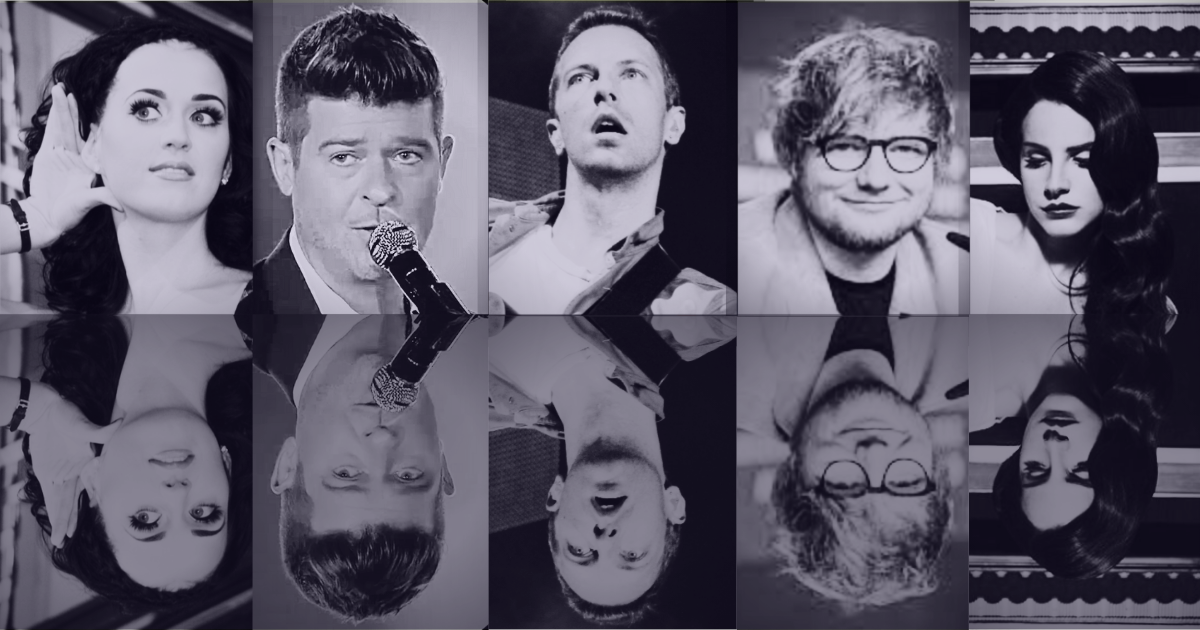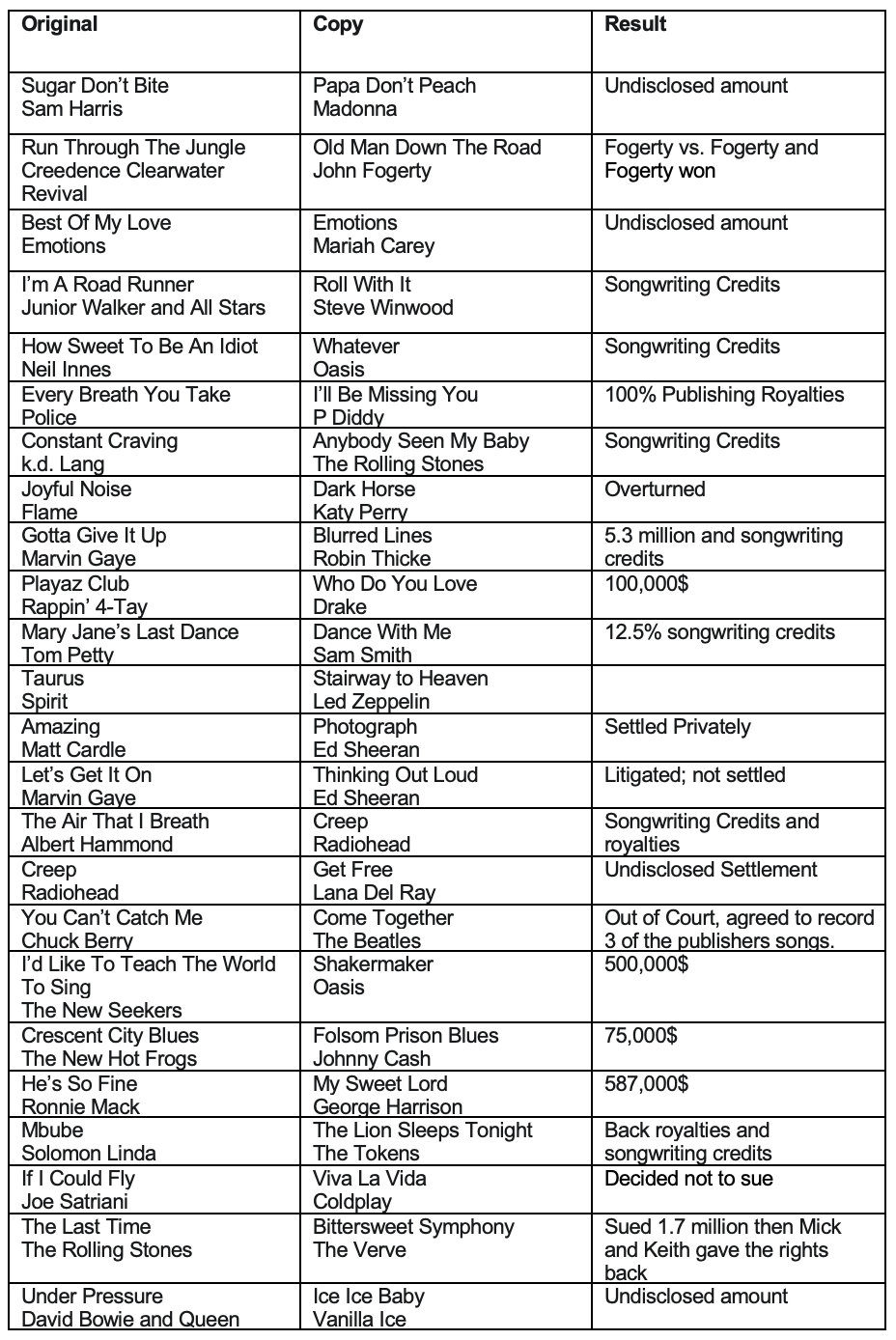
You’re listening to Ed Sheeran’s newest release and you hear, “This is your melody and these are your lyrics, lalala hahaha, I’m gonna make millions and you’re gonna get nothin’.” Of course that would never happen, because he writes all his own songs, oh snap, hold up a minute, oh ya, he wasn’t found guilty.
How are you going to know that someone else has used your material? Maybe with AI there will be a better solution for monitoring music. For now you just have to wait for the super famous popular artists that you will most likely be exposed to at some time in a shopping center or night club, to happen upon lyrics or melodies that were originally yours.
Music plagiarism is gauged by two criteria: Access & Substantial Similarity. You need to prove that your music had been copyrighted before the plagiarized version appeared. In the United States, according to the Copyright Law of 1976, copyright is automatically created as the song is created. I’ve been told to send yourself an email, of your composition or sound file, to create a timestamp. However a law firm states that, “A formal registration of the copyright with the U.S. Copyright Office is the only way to establish an enforceable copyright; Meaning you can only file a lawsuit if you have registered your music with the USCO. You can pay for this service, about 35 UDS per song, to have your song registered at a copyright organization and get a certificate for your song. Please bear in mind this only for the United States and other countries may have other standards.
I am not a lawyer, but I have heard that it is possible to secure your copyright in the process of creating and publishing a release for distribution. In this way the sound file, artwork, ISCR & UPC codes, lyrics, and all accompanying rights holders’ metadata is bound to one release. This is also true in the process of creating an NFT (Non-Fungible Token) and according to blockchain architects is infallible. The point is: Would these media be acceptable in a court of law? This is yet another example where law and policy fall behind technology.
The questions you need to ask yourself: How important is it for me to have my music registered and obtain a certificate of copyright authenticity from a government organization, just in case someone might rip off your music? Is it very likely this would happen to me? Is it worth paying 35 bucks per track to have it registered?
The headlines of cases that involve copyright plagiarism include: Ed Sheeran, Katy Perry, Robin Thicke, Marvin Gaye, The Beatles, Led Zeppelin, Tom Petty, RHCP, Coldplay, Radiohead, Johnny Cash, Oasis, Drake, and more. I have made a playlist of these cases, with the original and the accused rip off. Have a listen and hear for yourself what others might have heard and taken for their own. Some of the cases were overturned and others were settled, in or out of court. You will find the link at the bottom of the page.
Proving copyright infringement is a subjective endeavor exemplified by these cases where the accused was found to have “subconsciously plagiarized” the song or where the accused and the accusing party is for and against the same artist: Fogerty vs Fogerty.
Copyright infringement comes in many shapes and sizes. Copyright is ownership, property, and music is Intellectual Property, it is intangible, until it is realized into a physical form such as a recorded sound or printed lyrics.
Other forms of intellectual property such as Industrial Design, Trademarks, Trade Secrets, typically don’t face the readily lurking fear of copyright infringement that music does. James Bond most likely won’t be interested in stealing your music, unless it’s Bill and Ted’s, The Song That United The World.
What is the value of music? How do you put a price tag on something that is essentially priceless? Music is fluid like water or air, you only use it for some moment in time and then it moves on. So, music’s real value can only be appreciated when it is being used, listened to. It must live and the value of music can be explained in its most basic definition by its popularity.
That’s where we have markets to gauge the value of property. Every musical idea has the potential to be given a life and shared to the world if not become popular, so there is the compulsion for every creator to claim ownership to their own creations. This is an intrinsic need for us to show our worth and leave our mark on the world when we are gone. This is everyone’s right.
The point that hurts the most is the feeling of something being stolen and having no way to guard yourself against this crime. This hurts everyone. Without tools and information to guard ourselves we abstain from sharing our ideas.
The other point is that someone else is making financial gains from your ideas and that pisses us off because, “Hey, that was my idea!” And you are the one who should be thriving off the livelihood of your own creations, on your own terms.
Copyright infringement is using someone else’s ideas or works and claiming them as your own. This can be done with a direct intent to profit, or a carelessness, or a complete unawareness of a crime being committed. There are different levels of copyright infringement and they affect everyone no matter what the intent is.
This is where we get into muddy waters when we talk about copyright infringement, piracy and fraud. As an individual in the music market, the point here is that music is getting used but the creators are not getting paid. It happens every day. The only way we can trust, especially when at one time or another we’ve been hurt or screwed by someone else is through transparency; by being informed and having a thorough understanding.
Understand the kind of infringements that are possible. Is it systemic or individual? Anyone who has a beef with streaming music can argue that it is a violation of music on a systemic level because streaming music pays less than peanuts: It pays in chia seeds. This however is not infringing because you must agree to the terms when you distribute your music and however little you are getting paid, there is a record of it and you are still receiving compensation for its usage.
Coming to an agreement on how your music can be used is complicated. You have so many factors to consider, Performance Rights Organizations, labels, distributors, publishers, licenses, the list goes on. Governments have tried to enforce laws that help to guide the boundaries of copyright and music usage. Yet with ever evolving markets and technology, the policies that govern our IP are forever catching up; We could be waiting forever for policy, law and enforcement to be perfected to eliminate the chance of getting screwed. The only other option is to be informed and make an educated decision: Be informed by current standards, not: Old facts, sensational news, social media posts or personal opinion. Facts.
Royalty fraud is not copyright infringement but it does affect how systems are designed and creators get paid. It happens at the highest level and uses loopholes in the systems that govern how music usage is recorded and monetized. There is very little that we as individual artists can do about this kind of theft. We have to rely on the people who run these systems and the policies that govern them, that criminals cannot abuse these systems or when they do that they can be identified and brought to justice.
Have you heard of the two guys who siphoned off 23 million dollars from YouTube in 2021? How is this possible with all the safeguards in place? You’re probably thinking, “This can’t be the only case”, but most likely this type of scam is very rare. There will always be a -Wolf on Wall Street- waiting around the corner. A nightmare for sure, but one that would only affect a select group. It is more concerning when this type of copyright infringement is more common and happens on a much larger scale, that it could have a chance at affecting you.
Copyright policy and enforcement is slow but it is improving. To pass legislation is one step, but then to enforce it is another. Traditionally there is no international copyright and any issues with copyright are regulated by domestic law. However, there is the Bern Convention established 1886, which outlines the protection of literary and artistic works and any country that signs this convention must abide by it. China for example hadn’t signed the convention until 1992, and it was only in 2015 that the government forced unlicensed music to be removed from streaming service. Since then China has grown to be the 6th largest music market in the world surpassing South Korea.
The kind of copyright infringement we are most concerned about is how our music gets used by the listener, how it is recorded and how royalties are paid back to the creators. The type of technology and media dictate how we share and use IP. Moving physical media like microfilms, cassette tapes, vinyl, and CDs have been virtually eliminated with the invention of the Internet and digital distribution. Now nearly all usage of music is digital, which has brought a whole new box of toys.
The extent of digital piracy came to light with Napster. It was a necessary evil that exhibited the advancement of technology’s ability to critically affect people’s behavior and the markets, in regards to how people used and shared IP. It was a time when Spotify or Apple Music wasn’t around and it seemed legitimate to the majority of the people who used it. We know better now, not only that this type of sharing is infringement, but also of what the concept of copyright encompasses; If you use someone else’s ideas or creations you need to make sure you have the right to do so, which most often means you need to pay for it.
People still however steal IP by ripping and downloading streaming content via shady websites. These sites are watched and the amount of users are recorded to gauge the amount of piracy still prevalent today.
There is an upside to streaming and digital sharing, it has tipped the balance of the markets from the major record labels to independent artists. With the establishment of streaming platforms digital distribution was available for everyone, and with Myspace in 2003 and Facebook in 2004, so was promotion via social media. Those early adopters who knew how to use these platforms thrived.
Historically, music a song would only stay alive if someone copied and shared it. Troubadours would carry and sing the songs they had picked up and learned along their travels. This is still present in folk and blues circles. It’s when music is shared on a large scale that this seems to become a concern to people. Plagiarism and any form of copyright infringement is a very serious matter to consider when sharing your music to the masses, but worrying about it should not restrict you from distributing your music. Do you or do you not want people to hear you?
Gauge the situation and know your options. Be informed. I leave you with these two thoughts: A Confucian saying, “Any copying or imitating is a high form of flattery…” And a Finnish saying anytime someone leaves the country, “Nyt ollaan isossa mailmassa!” -Now we are in the big world!-
Rip Offs or Are They Playlist?
>
https://ew.com/article/2009/09/16/coldplay-satriani-lawsuit/
https://www.buzzfeed.com/williambarrios/musicians-who-were-sued-for-plagiarism
https://www.wipo.int/treaties/en/ip/berne/summary_berne.html
https://www.wipo.int/treaties/en/notifications/berne/treaty_berne_140.html
https://musicinfo.io/blog/china-the-6th-biggest-global-music-market
https://legamart.com/articles/international-copyright-law-top-court-cases/
https://www.forbes.com/sites/hughmcintyre/2018/03/21/what-happened-to-the-piracy-sites-that-nearly-destroyed-the-music-industry-part-1-napster/?sh=ebb4ed22293b
https://dataprot.net/statistics/piracy-statistics/
https://magroove.com/blog/en-us/music-plagiarism/
https://www.copyright.gov/title17/
https://www.theguardian.com/music/2022/apr/06/ed-sheeran-wins-court-battle-over-shape-of-you-plagiarism-accusation
https://www.ptslaw.com/blog/2022/02/does-sending-intellectual-property-in-an-email-constitute-an-effective-copyright/
https://lawyerdrummer.com/2017/03/music-plagiarism-2/
https://unicheck.com/blog/musicians-plagiarize
https://www.bbc.com/news/entertainment-arts-46550714
https://www.bbc.com/news/newsbeat-49161916
https://www.nytimes.com/1976/09/08/archives/george-harrison-guilty-of-plagiarizing-subconsciously-a-62-tune-for.html
CVR FI24789448 | © Musicinfo 2025 | All rights reserved.